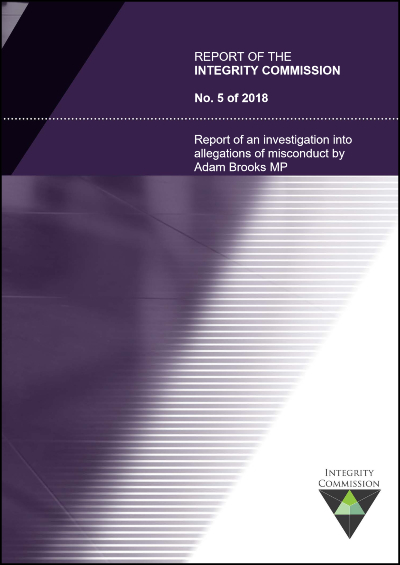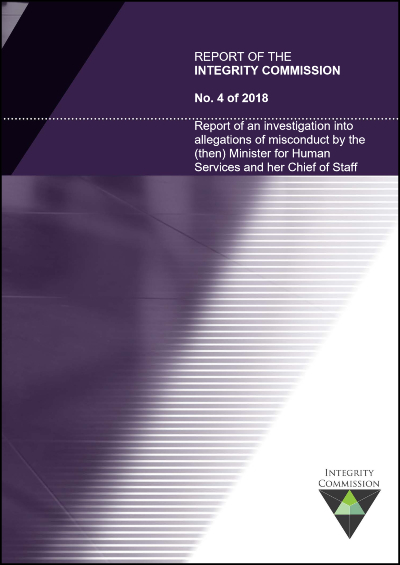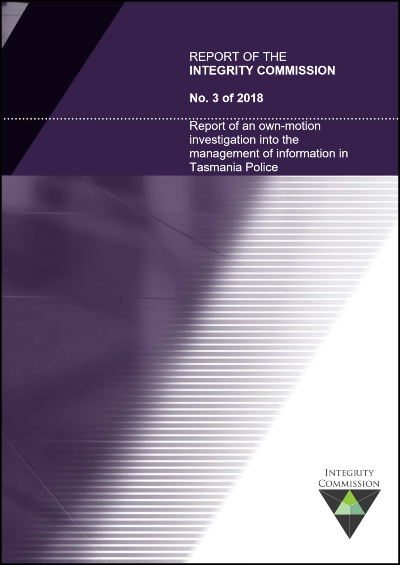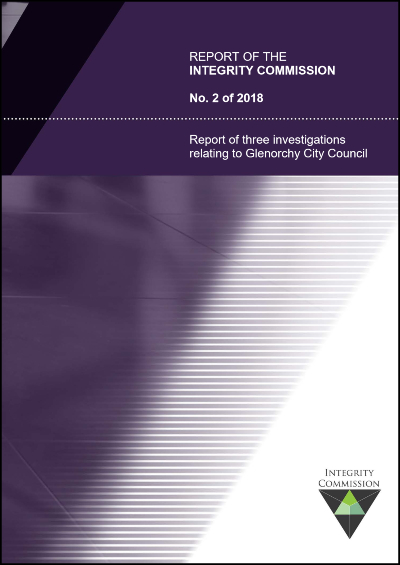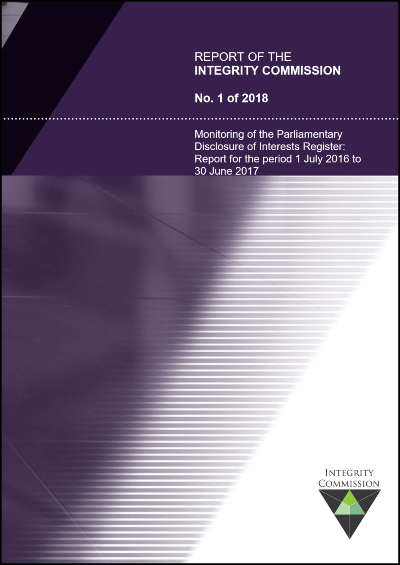Executive summary
On 30 June 2016, the Integrity Commission received a complaint from the then Leader of the Opposition, Bryan Green, outlining his concern about how conflicts of interest between the business interests and public duties of the then Minister for Mining, Adam Brooks MP, had been managed, and how the Premier, the Hon Will Hodgman MP, had responded to these issues.
The allegations
An assessment was undertaken to determine the nature of the allegations and whether they should be investigated by the Commission. The assessment identified the following allegations:
That the Premier:
- Failed to properly manage Mr Brooks’ conflicts of interest; and
- Facilitated a purposefully inadequate response to conflict of interest issues arising from Mr Brooks’ private company.
That Mr Brooks:
- Had an ongoing involvement in the operation and management of his business interests whilst a Minister.
- Did not advise the Premier of his involvement in the operation and management of his business interests whilst a Minister.
- Deleted emails that may have been evidence of misconduct through his ongoing involvement in the operation and management of his business interests.
- Took steps to hinder an audit by the Crown Solicitor of Tasmania of his email account.
- Misused information acquired in connection with the performance of his Ministerial functions.
The Premier’s role
At the completion of the assessment, the Commission determined that the allegations relating to the Premier should be dismissed, given no evidence of misconduct involving the Premier was identified. Although it is reasonable to observe that the management of, and the response to, the issues relating to Mr Brooks did not progress as the Premier might have anticipated, there is no evidence that his response was improper or purposefully inadequate. Rather, he took advice from senior State Service executives to manage the conflict of interest issues.
The investigation process
The investigation involved obtaining and analysing relevant documents regarding the management of the conflict of interest issues and Mr Brooks’ involvement with his private company, Maintenance Systems Solutions (MSS).
Of particular importance were emails sent from and received by Mr Brooks’ MSS email account while he was Mining Minister. These emails were produced to the Commission by MSS under coercive notice.
Mr Brooks was interviewed by the Commission and also provided written evidence, in the form of a statutory declaration.
Managing Mr Brooks’ conflict of interests
The Ministerial Code of Conduct as it existed when Mr Brooks was a Minister did not define a ‘material conflict of interest’. However, published guidance notes to the Code stated that:
A material conflict of interest exists when a Minister in carrying out his or her official duties, is or reasonably appears to be, improperly influenced by private interests or when an official decision of the Minster could improperly advantage the Minister personally, or a close relative, especially, but not only, in a financial sense.
Applying that definition, the investigation found that Mr Brooks did not have a material conflict of interest relating to the business activities of MSS. He was not improperly influenced by his private interest in MSS, nor did any decisions which he made improperly advantage the business or him. He did, however, have conflict of interest issues to consider and deal with by virtue of his association with MSS.
The Premier took steps to facilitate Mr Brooks’ management of these issues upon Mr Brooks’ appointment as a Minister. The Premier required Mr Brooks to comply with the Protocol for Managing Possible Conflicts of Interest – Minister for Mining, Minister for Racing and Minister for Building and Construction (‘the Protocol’), developed with input from senior executives within the State Service.
Step 2 of the Protocol required Mr Brooks to immediately appoint an independent manager of relevant businesses, and an independent agent to deal with the manager on Mr Brooks’ behalf until such time as all Mr Brooks’ interests were divested. The Protocol stated that ‘this should ensure the Minister has no involvement, in any form, formal or otherwise, in the management and operation of any of these businesses’.
Mr Brooks undertook in writing to the Premier to abide by the Protocol and agreed to remove himself from management and operational decisions of MSS.
The investigation findings
The investigation has found that Mr Brooks continued to be involved in the operation and management of MSS while a Minister.
The actions taken by Mr Brooks to comply with the Protocol and his reporting on these to the Premier were influenced by his view that he had no material conflict of interest. As outlined above, the investigation confirmed that his involvement with MSS did not amount to a material conflict of interest as defined for the purposes of the Ministerial Code of Conduct.
However the investigation concluded that Mr Brooks gave inaccurate written assurances to the Premier about his compliance with the Protocol, and failed to advise the Premier of the true nature of his involvement with MSS, when the Premier was relying on Mr Brooks’ advice and updates.
Mr Brooks answered questions about his use of his MSS email account in State Parliament on 9 June 2016. The investigation identified that later that night, Mr Brooks accessed, collated, forwarded and then deleted a number of MSS emails. Mr Brooks did not inform anyone – other than his business manager – of his actions.
The investigation found that, in deleting the emails, Mr Brooks was motivated by genuine concerns about the protection of his family’s privacy, his ongoing marital proceedings and of private business information that could have been detrimental to the interests of MSS if publicly released.
However, the investigation also found that Mr Brooks was motivated by a concern that the MSS emails had the potential to cause him political damage.
The investigation found that in deleting the emails Mr Brooks intended to prevent detection of evidence that he had not removed himself from management and operational decisions of MSS when he was a Minister, as required by the Protocol agreed with the Premier.
Following the deletions, on 10 June 2016 Mr Brooks proposed an audit of his email account to the Premier knowing that he had deleted emails from that account. Mr Brooks did not advise the Premier, and the Premier was not aware, that he had deleted emails from that account.
The Premier subsequently appointed the Crown Solicitor to audit all MSS emails sent from and received by Mr Brooks when he was a Minister, to determine whether he was participating in decisions concerning the operations of MSS, and whether he was provided information in relation to MSS that was not otherwise in the public domain.
Mr Brooks did not advise the Crown Solicitor, and the Crown Solicitor was not aware, of the deleted emails. The Crown Solicitor’s audit has not been completed given that Mr Brooks has not provided the emails for the relevant period, due to his concerns about his marital proceedings and privacy.
The Commission concluded that even if Mr Brooks had been solely motivated by privacy concerns when deleting the emails, he should have advised the Premier of the deletions, both prior to and after the audit being formulated.
The Commission’s determination of the matter
The Board of the Commission determined to refer the matter to the Premier for his consideration and action. The Board has made no specific recommendations as to what action the Premier should take.
Related content: Media release

